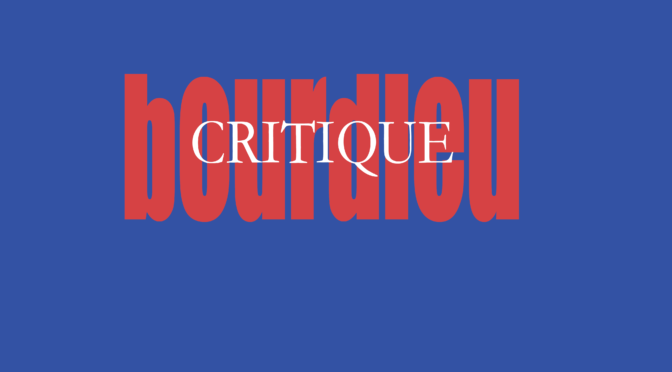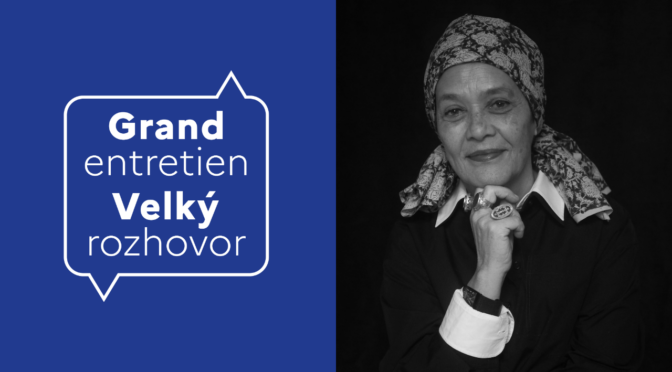
On the occasion of the twentieth anniversary of the Bourdieu’s death, CEFRES in collaboration with the Department of Czech and Comparative Literature of the Charles University in Prague organizes a round table on the development of the Bourdieu’s central concepts during last two decades.
Bourdieu’s Legacy in Literary Studies: Expanding Territories, Changing Concepts
When: Friday, December 2, 2022, 4.30-6.30pm
Where: CEFRES library, Prague and online:
To register, please contact cefres[@]cefres.cz
Language: English
Organizers: CEFRES & Department of Czech and Comparative Literature, Faculty of Arts, Charles University
Participants:
Anna SCHUBERTOVÁ (Department of Czech and Comparative Literature, Faculty of Arts, Charles University)
Csaba SZALÓ (Faculty of Social Studies, Masaryk University)
Jan VÁŇA (Institute of Czech literature, Czech Academy of Sciences)
Eva VOLDŘICHOVÁ-BERÁNKOVÁ (Department of Romance Studies, Faculty of Arts, Charles University)
Moderated by: Josef ŠEBEK (Department of Czech and Comparative Literature, Faculty of Arts, Charles University)
As in many other branches of research, Bourdieu’s contribution in literary studies is unquestionable. The theory of the literary field, which had been in the making since the end of the 1960s and found its most comprehensive and developed shape in The Rules of Art (1992), has a lasting impact both in literary theory and literary history. Other Bourdieu’s works inspire literary research as well, from the early article “Intellectual Field and Creative Project” (1966) to Pascalian Meditations (1997). His lectures at Collège de France whose transcripts are still being published also offer an abundance of impulses for literary scholarship. Yet equally substantial is the production of his collaborators and successors that maintain this living body of work, transpose it to different theoretical and methodological contexts and provide its operationalization and critical analysis. In the framework of the series of events PIERRE BOURDIEU 2022 we want to address some of the nodal points of these developments in the past two decades, focusing on the expanded territory of research – intellectual field, translation studies, study of literature and politics, world literature, ethnography of authors, the study of self-presentation of authors in current media environment, etc. – and concepts ranging from new perspectives on the literary field to ethos and author’s posture. We want to trace these developments and assess Bourdieu’s magisterial contribution in the context of current research.
Calls for applications at CEFRES for 2015 are now published. For fellow researchers in France wishing to apply for a 2 to 6 month-long research residency at CEFRES, applications must be sent before July 15th.
See our call for applications.
Calls for applications at the CEFRES for the year 2015-2016 are now published.
- For Charles University’s and Czech Academy of Science’s doctoral students: (1.9.2015-31.8.2016, deadline June 20th 2015)
- For PhD students and post-doctoral researchers from France, Hungary, the Czech Republic, Poland and Slovakia: (1.9.2015-31.8.2016, deadline: June 20th 2015)
- For French researchers (duration: from 2 to 6 months, deadline: July 15th 2015)
See our calls for applications
 A lecture by French sociologist and CNRS professor Pierre Lascoumes, in the frame of the lectures of the CEFRES Platform. His presentation will be discussed by Pavol Frič (ISS FSV UK), who dedicates part of his research to the analysis of corruption in the relationships between elites and public sphere in the Czech republic.
A lecture by French sociologist and CNRS professor Pierre Lascoumes, in the frame of the lectures of the CEFRES Platform. His presentation will be discussed by Pavol Frič (ISS FSV UK), who dedicates part of his research to the analysis of corruption in the relationships between elites and public sphere in the Czech republic.
Language: in French, with simultaneous Czech translation.
Where: Národní 18, Prague 1, conference room, 7th floor.
Trained as a jurist and a sociologist, Pierre Lascoumes (CNRS and Centre d’Etudes européennes of Sciences-Po Paris) has led major works on the perceptions of corruption and economic and financial crimes. He’s also a lead in the field of the history and the implementation of environmental policies and risk management.
His latest work, cowritten with Prof. Carla Nagels, a specialist in criminology, deals with recent cases (such as Bettencourt, or HSBC), which despite their strong médiatisation, have benefited from a form of social acceptation in France (Sociologie des élites délinquantes: de la criminalité en col blanc à la corruption politique). A man of theater, Pierre Lascoumes has also created a play in 2015 around a text written by Mazarin, which gave some insight on the Cahuzac case.

A lecture by Jérôme Heurtaux (CEFRES director) as part of the Franco-czech historical seminar organized by Institute for Czech History of the Faculty of arts, Charles University (FFUK), in collaboration with CEFRES.
Venue: Faculty of Arts of Charles University, nám. J. Palacha 2, Prague 1, room 201
Date & Time: 21 November 2019, 9:10-12:10
Language: French
Abstract:
As a canonical object of social sciences, the revolutionary phenomenon provoked numerous comparative approaches in sociology, history and political sciences. Which statement can we draw from the international comparison of revolutions? On the strength of the scientific literature and of his own searches about the fall of communism in Poland and about the Tunisian revolution, Jérôme Heurtaux will point out the advantages and the limits of the comparative exercise, and will make the case for a controlled and an erratic comparison.
JÉRÔME HEURTAUX is director of the French Research Center in Humanities and Social Sciences (CEFRES) in Prague. He is a specialist in regime change and in democratic transitions. Among his several publications belong La démocratie par le droit. Pologne 1989-2016 (Presses de Sciences po, 2017), Introduction à l’Europe postcommuniste (avec Frédéric Zalewski, De Boeck, 2012) and 1989 à l’Est de l’Europe. Une mémoire controversée (in co-direction with Cédric Pellen, L’Aube, 2009). He publishes in 2019 Pologne, 1989. Comment le communisme s’est effondré (Éditions Codex).

Decolonizing Feminism – Grand Entretien with Françoise Vergès
On the occasion of the publication in the Czech edition of Un féminisme décolonial (La Fabrique, 2019) by Karolinum, CEFRES, the French Institute in Prague and Charles University invite you to a Great Interview with the author Françoise Vergès.
When: Wednesday, March 12, 2025, 6 pm
Location: French Institute in Prague, Štěpánská 35, Prague 1
Language: French with simultaneous Czech interpretation
Moderator: Chiara Mengozzi (CEFRES / Faculty of Arts, Charles University)
Who cleans up the world? With this question, Françoise Vergès introduces a Decolonial feminism, taking as her starting point the underpaid, underestimated work that women, the majority of them racialised, do everyday all over the world, to make a society work. This feminism sees itself as the only one with a true understanding of women’s rights. Françoise Vergès defends an anti-racist and anti-capitalist feminism. Continue reading CANCELED – Grand Entretien with Françoise Vergès →




